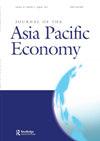Building an open and stable capital market: a supervision intensity perspective
IF 1.5
4区 经济学
Q3 ECONOMICS
引用次数: 2
Abstract
Abstract This article investigates the impact of supervision intensity on stock price crash risk (SPCR) in China. A firm’s decision to hide bad news lies in the trade-off between the benefits of violation and the costs of being punished by government regulations. Our research findings reveal an inverted U-shaped relationship between SPCR and supervision intensity. Institutional shareholding strengthens the inverted U-shaped relationship between supervision intensity and SPCR through the mediating effect. This inverted U-shaped relationship is even more sensitive in low transparency firms. Better local market conditions and external auditing seemingly enhance supervision effectiveness, and hence mitigate SPCR. This article also discusses the supervision of other developed countries, such as the USA, Japan, and the UK, as well as other historical evidence to further inform the design of open and stable capital markets, particularly in the Chinese context.构建开放稳定的资本市场:一个监管强度的视角
摘要本文考察了监管强度对中国股票价格暴跌风险的影响。一家公司隐瞒坏消息的决定在于违规的好处和受到政府法规惩罚的成本之间的权衡。我们的研究结果揭示了SPCR与监管强度之间的倒U型关系。机构持股通过中介作用强化了监管强度与SPCR之间的倒U型关系。这种倒U型关系在低透明度公司中更为敏感。更好的当地市场条件和外部审计似乎提高了监管的有效性,从而减轻了SPCR。本文还讨论了美国、日本和英国等其他发达国家的监管,以及其他历史证据,以进一步为设计开放稳定的资本市场提供信息,特别是在中国背景下。
本文章由计算机程序翻译,如有差异,请以英文原文为准。
求助全文
约1分钟内获得全文
求助全文
来源期刊

Journal of the Asia Pacific Economy
ECONOMICS-
CiteScore
3.70
自引率
7.10%
发文量
58
期刊介绍:
Journal of the Asia Pacific Economy (JAPE) is concerned primarily with the developing economies within Pacific Asia and South Asia. It aims to promote greater understanding of the complex factors that have influenced and continue to shape the transformation of the diverse economies in this region. Studies on developed countries will be considered only if they have implications for the developing countries in the region. The journal''s editorial policy is to maintain a sound balance between theoretical and empirical studies. JAPE publishes research papers in economics but also welcomes papers that deal with economic issues using a multi-disciplinary approach. Submissions may range from overviews spanning the region or parts of it, to papers with a detailed focus on particular issues facing individual countries. JAPE has a broad readership, which makes papers concerned with narrow and detailed technical matters inappropriate for inclusion. In addition, papers should not be simply one more application of a formal model or statistical technique used elsewhere. Authors should note that discussion of results must make sense intuitively, and relate to the institutional and historical context of the geographic area analyzed. We particularly ask authors to spell out the practical policy implications of their findings for governments and business. In addition to articles, JAPE publishes short notes, comments and book reviews. From time to time, it also publishes special issues on matters of great importance to economies in the Asia Pacific area.
 求助内容:
求助内容: 应助结果提醒方式:
应助结果提醒方式:


